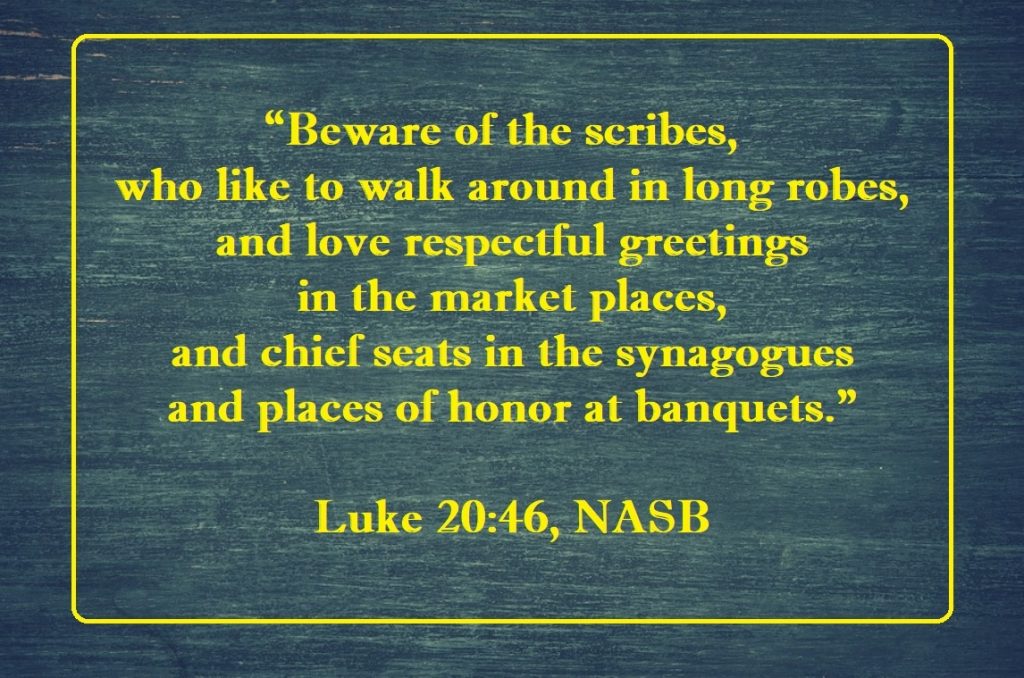“Go therefore and make disciples of all the nations…teaching them to observe all that I commanded you; and lo, I am with you always, even to the end of the age” (Matthew 28:19-20, NASB).
——————–
Contents:
1) “Get Real” (Kyle Pope)
2) The Best Seats in the House (Mark 12:38-40) (Warren E. Berkley)
3) Honor the Presence of an Old Man (Joe R. Price)
——————–

-1-
“Get Real”
Kyle Pope
A few years ago, I found a little accessory for my computer on eBay and sent an e-mail to the seller asking him if he would take $18.00 for it. Apparently he thought that offer was far too low and responded rather bluntly, “$18.00?—Get real!” That was not the first time I had heard that expression. It was his way of saying, “$18.00 is not a realistic offer for this item.” Around that time, young people used variations of this as a form of greeting. Two kids leaving each other might say, “keep it real!” It was a way of saying, “be yourself,” or “don’t let anyone make you what you’re not.” It could even mean simply, “see you later—hope things go well with you.” Although these types of expressions, like others of the past, were short-lived and not used as often anymore, I have thought about the significance of such words if considered from a spiritual perspective. Let’s consider a few applications.
We Should “Get Real” in Our Treatment of Others. Far too often Christians allow themselves to be very inconsistent in their treatment of other people. A brother or sister may be kind and loving to others, but rude and cruel to members of their own family. A child of God may talk about God’s love while assembled for worship or Bible study then yell at a driver on the road or give a server in a restaurant a tongue lashing. Or, perhaps we show partiality to those who are wealthy and attractive but disregard those who are not. In doing so we may convince ourselves that we are good, faithful Christians all the while ignoring the reality of our condition before God. The apostle John taught, “Beloved, let us love one another, for love is of God; and everyone who loves is born of God and knows God” (1 John 4:7, NKJV). In defining love, Paul begins, “Love suffers long and is kind; love does not envy; love does not parade itself, is not puffed up; does not behave rudely, does not seek its own, is not provoked, thinks no evil” (1 Cor. 13:4-5). We must honestly evaluate our treatment of others if we are to see how we really stand before God.
We Should “Get Real” in Our Understanding of Sin. Souls outside of Christ do not take a realistic view of their sin. It may seem to them as something fun and pleasurable. Taking an interest in spiritual things may seem boring and unnecessary to them. The reality of the situation is that sin against God is a vicious cancer that eats away at our souls, it separates us from God, and promises only condemnation. The alien sinner is not the only one who can fail to realistically understand his sin. Christians may excuse certain behavior saying, “that’s just the way I am!” They may imagine their good works eliminate the need for the saving blood of Christ. These attitudes reflect a view of sin that is unrealistic and spiritually deadly. Paul told the Romans bluntly, “For the wages of sin is death, but the gift of God is eternal life in Christ Jesus our Lord” (Rom. 6:23). John declared plainly, “Little children, let no one deceive you. He who practices righteousness is righteous, just as He is righteous. He who sins is of the devil” (1 John 3:7-8). That’s reality.
We Should “Keep It Real” When It Comes to Our Behavior. The casual expression that was used by young people reflects an understanding of the fact that many of us, whether as adults or children, can be hypocritical in our behavior. We want to be Christians on Sunday and Wednesday but worldly the rest of the time. We may become timid around classmates or coworkers and ashamed to let people know our faith. We allow life circumstances to determine whether we will be faithful in our church attendance or we may lie to maintain appearances, get ahead, or take advantage of someone. When we do these things, we are trying to fool ourselves into thinking if no one else sees our duplicity it’s no big deal. The reality of the situation is that our duplicity nullifies our faith. The “part-time” Christian is a “full-time” sinner! James teaches, “Draw near to God and He will draw near to you. Cleanse your hands, you sinners; and purify your hearts, you double-minded” (Jas. 4:8). The reality is, that if we live the double-minded life of the hypocrite, we can’t please God.
We Should “Keep It Real” When it Comes to Our View of this World. Nothing about this world should lead us to think that it is permanent. All plants, animals and people wither, decay, and die. Even rocks, mountains, and streams crumble, erode, and evaporate. Yet, many of us want to live our lives as if this world will last forever. We may not be able to see the spiritual side of our makeup, but the reality of the matter is that our soul is the only thing about us that is “real” in the sense that it is enduring. Yes, this world exists, and our bodies exist—but only for a time. One day they will both be burned up and dissolved into nothing! John said through the Holy Spirit, “the world is passing away, and the lust of it; but he who does the will of God abides forever” (I John 2:17). What plans are we making for the eternity? What provision are we making for what is truly real and enduring? We must “get real” about spiritual things.
— Via Faithful Sayings, Volume 24, Issue 50 (December 11, 2022)
——————–

-2-
The Best Seats In The House
Mark 12:38-40
Warren E. Berkley
When attending a concert, play or movie, you may want “the best seats in the house.” For optimum vision and listening, that desire is understood. In the Jewish community of Jerusalem in the time of Christ, there were men who desired the best seats in the house, but not in this sense. They wanted the best places or “chief seats” as part of their exaltation of themselves and their aim “to be seen of men” (Matt. 23:5).
During the last week of His life, our Lord described this evidence of selfish ambition, and wanted the people to beware of these scribes.
“As he taught, Jesus said, ‘Watch out for the teachers of the law. They like to walk around in flowing robes and be greeted in the marketplaces, and have the most important seats in the synagogues and the places of honor at banquets. They devour widows’ houses and for a show make lengthy prayers. Such men will be punished most severely'” (Mark 12:38-40, NIV).
If Jesus says, certain people will be “punished most severely,” we should do two things: (1) Avoid that behavior and the attitudes that lead to it, and (2) Watch out for those who exhibit that behavior; we must resist their influence on us. While we must not act out of ugly anger, I believe we ought not to give them the reverent salutations they covet.
These men never missed an opportunity to parade their status, show their rank and remind people of their power. They wore religious garments to draw attention to themselves. Their carnal sanctimonious attitude was fed when common people saluted them. And in synagogues and banquets, they demanded VIP seating. These men were driven by the attention they believed they earned. They were hypocrites, with hearts filled with self-importance. Their “religion” had nothing to do with any love for God.
This is obvious when you consider (1) their ungodly, ostentatious practice of prayer, and (2) their dreadful mistreatment of widows. They were outwardly religious, but inwardly corrupt. That corruption was evident in their devouring of vulnerable widows. Some historical accounts suggest, these men robbed widows of property, peace and livelihood to enrich themselves, pretending the money was for the Lord!
Jesus warns us about self-exalted, unscrupulous people. He condemns them as worthy of punishment. “Pretension ever hides emptiness, and often guilt. Fixed for ever for our repugnance, hatred, and contempt is the character of the religious pretender in the Gospel. Men need to be warned that there is more danger to the soul in pretending to a piety we have not got, than in merely having none at all” (E. Johnson, Pulpit Commentary, Mark 12).
Notice in this context: Before this passage and after this passage — Jesus describes the opposite attitude and behavior. In Mark 12:28-34, love God with all your heart and love your neighbor as yourself. In Mark 12:41-44, He gives an example of generosity from the very class oppressed by the scribes. In vivid contrast to the greedy scribes, there is the widow who gave “all that she had to the Lord.”
If I am personally serious about avoiding the hypocrisy of the scribes, I will love God, love my neighbor and give as the widow gave.
— Via Expository Files 9.1; January 2002
——————–

-3-
Honor the Presence of an Old Man
Joe R. Price
“You shall rise before the gray headed and honor the presence of an old man, and fear your God: I am the Lord” (Leviticus 19:32).
Growing old is natural. The old were once young, and the young will become old. These things are too self-evident to warrant comment. Today’s command from the Law of Moses trained Israel to have respect for the elderly. But more than that, showing respect toward the aged is described as growing out of one’s fear of God. He is “Lord” (YHWH, Jehovah), the eternally-existing one. Ultimately, we do not have power over the aging process, He does. Being disrespectful toward an older person reflects a fundamental failure to respect God, who gives life (both young and old). So, when you come upon an older person in the grocery store who can no longer push the shopping cart as quickly as you, don’t become frustrated. When the older person is driving slower than you think he should, be patient. The “old man” should not be discounted because of his age, any more than the strength of the youth should be discounted by the aged. There is a place in this world for both. “The glory of young men is their strength, and the splendor of old men is their gray head” (Proverbs 20:29). Whether young or old, we must fear God because He is timeless.
— Via Articles from the Knollwood church of Christ, February 2019
——————–
The Steps That Lead to Eternal Salvation
1) Hear the gospel — for that is how faith comes (Rom. 10:17; John 20:30-31).
2) Believe in the deity of Jesus Christ, the Son of God (John 8:24; John 3:18).
3) Repent of sins. For every accountable person has sinned (Romans 3:23; Romans 3:10), which causes one to be spiritually dead (Ephesians 2:1) and separated from God (Isaiah 59:1-2; Romans 6:23). Therefore, repentance of sin is necessary (Luke 13:5; Acts 17:30). For whether the sin seems great or small, there will still be the same penalty for either (Matt. 12:36-37; 2 Cor. 5:10) — and even for a lie (Rev. 21:8).
4) Confess faith in Christ (Rom. 10:9-10; Acts 8:36-38).
5) Be baptized in water for the remission of sins (Mark 16:16; Acts 2:38; 22:16; 1 Pet. 3:21). This is the final step that puts one into Christ (Gal. 3:26-27). For from that baptism, one is then raised as a new creature (2 Cor. 5:17), having all sins forgiven and beginning a new life as a Christian (Rom. 6:3-4). For the one being baptized does so “through faith in the working of God” (Col. 2:12). In other words, believing that God will keep His word and forgive after one submits to these necessary steps. And now as a Christian, we then need to…
6) Continue in the faith by living for the Lord; for, if not, salvation can be lost (Matt. 24:13; Heb. 10:36-39; Rev. 2:10; 2 Pet. 2:20-22).
——————–
Tebeau Street
CHURCH OF CHRIST
1402 Tebeau Street, Waycross, GA 31501
Sunday: 9 a.m. Bible Classes and 10 a.m. Worship Service. We also have a Congregational Song Service at 5 p.m. for every first Sunday of the month.
Wednesday: 7 p.m. Bible Classes
evangelist/editor: Tom Edwards (912) 281-9917
Tom@ThomasTEdwards.com
https://thomastedwards.com/go/all.htm/ (This is a link to the older version of the Gospel Observer website, but with bulletins going back to March 4, 1990.)




